-
SATURDAY FICTION 兰心大剧院 (Lou Ye 2019)
LOU YE: SATURDAY FICTION 兰心大剧院 (2019)

GONG LI IN ISATURDAY FICTION
Exploded atmosphere
Lou Ye's elaborate new black-and-white spy film, a showcase for the still glamorous and beautiful Gong LI set in Shanghai in the week before the December 7, 1941 bombing of Pearl Harbor, is glamorous and atmospheric. One revels in the rainy streets, the big heavy black cars, the men and women dressed to the nines, the public rooms and suites of the elegant "Cathay Hotel" and a puzzling theater stage that seems like a dance hall perpetually in motion.
If I told you that I never quite understood exactly what was going on, that might not differentiate this movie from Casablanca or The Big Sleep. But something is lacking in the characterizations and the dialogue that those classics have. When it is all over and more than two hours have passed, there has been a lot of mystery and finally a lot of noise and blood, but there is not much satisfaction.
The action takes place in the cosmopolitan "French Concession," a place apart in the "solitary island" that the city of Shanghai has been since it was occupied by Japan in 1937 and a privileged neutral zone. Here, Jean Yu (Gong Li, as a famous actress, not a stretch) has come to join Tan Na (Mark Chao), the lead actor and director, in a play, to be staged at Shanghai's Lyceum Theatre, and they are former lovers. This much is clear.
But the scene in which they first meet here blurs the line between reality and theater, and it keeps getting repeated. I never quite understood why. (It almost seems the director of the film has mistakenly left in alternate takes, an effect that's intriguing, but also distracting.) The action begins in murkiness. And while there are continually moments in the light as various characters, French, German, Japanese, and Chinese, come and go, that murkiness continues and floods our perception of the proceedings. We are trapped in ongoing rehearsals, interrupted by double-crosses, surprised by furtive sendings of encrypted messages, and stunned by fatal shootouts. And yet the murkiness triumphs.
Toward the end, the on screen audience assembles for the play, entitled, yes, Saturday Fiction. But Jean Yu cannot perform because she is in too much danger. Her role is taken, temporarily, by Bai (Huang Xiangli), a reporter, spy operative, and acting hopeful who has infiltrated herself early on into Jean Yu's life. Switcheroos and multiple roles are the essence of this piece.
Jean Yu, who's been in Hong Kong a while, is ceremonially greeted as she arrives in the French Concession by the Cathay Hotel's manager Saul Speyer (Tom Wlaschiha of "Game of Thrones"). He turns out to be spying for the Allies, and will report also on all her activities. She has come not only for the play but to locate her ex-husband, and get him out of the hands of the Japanese, who have captured him. She has been a spy operative herself, hence Saul Speyer's special interest. But she's here also for a third reason. She's been summoned by Frédéric Hubert (Pascal Greggory), a French book dealer who reveals his possession of a rare copy of Sorrows of Young Werther signed not only by the author, Johann Wolfgang von Goethe, but by Friedrich Nietzsche. M. Hubert walks with a cane, but it's just an elegant accoutrement. He's quietly natty dresser who's also a spymaster who has looked over Jean Yu over the years while running her espionage missions for some years.
This is a movie that goes a little too slow for quite a while, until it goes too fast. It steeps itself in rich period atmosphere (though with a few touches that are plainly anachronistic), and lingers over Jean Yu's meetings with various men, and has to take time to introduce us to the puzzling play, the Cathay Hotel's labyrinthine passages, and the cast of characters. The latter include Mo Zhiyin (Wang Chuanjun), the Lyceum's untrustworthy and malicious producer, and importantly, Captain Saburo (Joe Odagiri), a Japanese military intelligence officer who has come to Shanghai to distribute to his operatives the updated Japanese operational codes. These M. Hubert is extremely keen on learning. It so happens that Jean Yu may be able to help him pry them out of Saburo, because she closely resembles his dead wife. (Several people get slipped a sleeping potion that helps unlock their secrets.)
Once all this gets set up, the Japanese come in, violence breaks out, and Jean Yu, in the semi-darkness, becomes a nearly indestructible superhero on the Chinese side, capable of wielding a pistol and an automatic weapon with equal pinpoint accuracy. After the long scenes of dreamy dialogue, I confess I found this sudden turn to violence bewildering. After all, it's Gong Li. All that lovely, if somewhat draggy, atmosphere, exploded, thrown away in a prolonged shootout? It seems modern directors love doing period but lack insight into the genres that go with it. Watch, though, to see what happens to The Sorrows of Young Werther, in a memorable sequence when M. Hubert slips away.
Saturday Fiction 兰心大剧院 (Lyceum Theatre), 125 mins., debuted at Venice Sept. 2019, also in five other festivals including Toronto and New York, screened at the NYFF for this review. Slated for US release by Kino Lorber. Metascore: 51%.
.
Last edited by Chris Knipp; 10-09-2019 at 09:57 AM.
-
ATLANTICS/ATLANTIQUE (Mati Diop 2019)
MATI DIOP: ATLANTICS/ATLANTIQUE (2019)
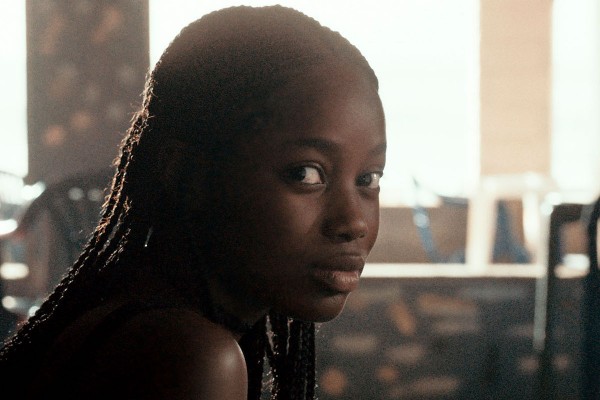
MAME BINETA SANE, WHO PLAYS ADA IN ATLANTICS
Economic desperation, drowned African refugees, a love story and a ghost story
Atlantics is a refugee drama, transformed into magic and mystery and revenge by possession, that focuses on the women left behind by a group of men suddenly lost at sea when desperation in their work leads them to try to sail to Spain in an open boat. It focuses on a popular suburb of Dakar, poor but vibrant with youth, where workers on a construction site with a futuristic (CGI) tower have striven for months without pay. Among them is Souleiman (Traore), the tall, handsome young lover of Ada (Mame Bineta Sane), who is to marry the well-off Omar (Babacar Sylla) in ten days. A French reviewer called this film "an emotional, visual, and sonorous poem." As the action plays out, the real gives way to dream: the young women take back their power through being possessed by the spirit of their men. The busy trailer for the film uses the tag line DF Wallace's biographer DT Max links to him, "Every love story is a ghost story."
Despite its grand prize, a few French critics found the 36-year-old Diop's film mix of genres lacked mastery; resorted too often to shots of the sea or the full moon. Mike D'Angelo was bothered by the fact that Soleiman possesses the notably fit and young police inspector Issa (Amadou Mbow) instead of Ada and can't agree with Jay Weissberg's interpretation that in his Variety review that this switch is to "avoid any same-sex 'awkwardness' towards the end." Maybe what both writers really object to is resorting to the supernatural to resolve socioeconomic issues in the first place. That is what bothers me - while nonetheless Diap's choice to focus on the bereaved women, partly a practical one, seems justified as a way of examining the tragedy of drowned African refugees.
The main force of the action is that grief is transformed into righteous anger when a group of the women turn milky-eyed at night and go several times to haunt the crooked building project boss, Mr. N’Diaye (Diankou Sembene) and eventually force him to pay them all the lost men's back wages. But there is also the brief return of Soleiman in the body of the fit Issa to make love once with the bereaved Ada. Soleiman's entering the body of Issa is emotional logic, the only kind that prevails here.
This is a film that makes great sense overall but has shortcomings in the details. You can find fault with various plot elements. Another is that though Ada has the conservative friend, Mariama (Mariama Gassama), who berates her for not being nice to her new rich husband she doesn't love, Omar, it would have been better to include severe hijab-wearing friends, and not just fun-loving ones. D'Angelo certainly has a point that Inspector Issa's investigation of the fire of the marriage bed and persecution of Ada is repetitious and inexplicable. The repeated shots of the sea are indeed repetitious, though they do serve as a reminder of its devouring maw and the loss of all the fine young men.
But all this is beside the point in a way because what is enchanting and strong is the way Mati Diap captures the vivacity and physical beauty of the Senegalese people here. This is Africa, and the film shows us what that means. Soleiman is a gorgeous young man, tall, pretty, with the long, loose, forward stride they all have, which conveys a sense of optimism, strength, confidence: you can imagine how they'd think they could sail to Spain in a little open boat. Ada is equally beautiful, slim, supple, forward-striding, charming, coquettish. In their brief afternoon scene when they kiss and long for more, and there is never a goodbye and Soleiman (like all the men) never tells his beloved he is going to sail away, is yet a bright and memorable moment full of sensuality and lost promise.
Likewise all the scenes of the women afterwards glow with color and energy. The action sparkles. The whole film flashes and pops, underlined by Fatima Al Qadiri's music and Claire Mathon's cinematography that is somehow vivid and rough, in-your-face yet pleasing, a palette that's "muted," as Weissberg says, emphasizing the people, and the (bright and often hazy) light. Even the repetitious full moon and sea horizon shots underline the sensual simplicity of the style. The vigor of the young men is so well conveyed in the opening scenes that their temporary survival after death in the night-possessed women feels possible. This is about the beauty of African youth and an energy and strength that can live on after death. Even if Diap's story choices seem alien to you, you can feel that they come from somewhere profound. This is a film bold in its ambition and imagination, so much so it skips over certain details of logic or consistency.
Atlantics/Atlantique, 104 mins., debuted in Competition at Cannes May 16, 2019, and subsequently was awarded the Grand Prix. Mati Diop is the first woman of African descent to have a film showing in Competition at the festival or win an award in its 72 years. The film opened theatrically in Dakar in Aug. Eight other festivals are listed including London, the Hamptons, Chicago and New York. It was screened at the NYFF for this review Oct. 9, 2019. AlloCiné press rating 3.4 from 28 review (though many admired it, a good number of French critics also found it seriously flawed), while the Anglophone critics response was apparently much more glowing, given a Metascore of 81% (based on 14 reviews).
Last edited by Chris Knipp; 10-10-2019 at 11:46 AM.
-
PARASITE (Bong Joon-ho 2019)
BONG JOON-HO: PARASITE 기생충 (Gisaengchung) (2019)

LEE SON-KYUN AND JO YEO-JEONG IN PARASITE
Crime thriller as social commentary? Maybe not.
I've reviewed Bong's 2006 The Host ("a monster movie with a populist heart and political overtones that's great fun to watch") and his 2009 Mother which I commented had "too many surprises." (I also reviewed his 2013 Snowpiercer.) Nothing is different here except this seems to be being taken more seriously as social commentary, though it's primarily an elaborately plotted and cunningly realized violent triller, as well a monster movie where the monsters are human. It's also marred by being over long and over-plotted, making its high praise seem a bit excessive.
This new film, Bong's first in a while made at home and playing with national social issues, is about a deceitful poor family that infiltrates a rich one. It won the top award at Cannes in May 2019, just a year after the Japanese Koreeda's (more subtle and more humanistic) Palm winner about the related theme of a crooked poor family. Parasite has led to different comparisons, such as Losey's The Servant and Pasolini's Theorem. In accepting the prize, Bong himself gave a nod to Hitchcock and Chabrol. Parasite has met with nearly universal acclaim, though some critics feel it is longer and more complicated than necessary and crude in its social commentary, if its contrasting families really adds up to that. The film is brilliantly done and exquisitely entertaining half the way. Then it runs on too long and acquires an unwieldiness that makes it surprisingly flawed for a film so heaped with praise.
It's strange to compare Parasite with Losey's The Servant, in which Dick Bogarde and James Fox deliver immensely rich performances. Losey's film is a thrillingly slow-burn, subtle depiction of class interpenetration, really a psychological study that works with class, not a pointed statement about class itself. It's impossible to speak of The Servant and Parasite in the same breath.
In Parasite one can't help but enjoy the ultra-rich family's museum-piece modernist house, the score, and the way the actors are handled, but one keeps coming back to the fact that as Steven Dalton simply puts it in his Cannes Hollywood Reporter review, Parasite is "cumbersomely plotted" and "heavy-handed in its social commentary." Yet I had to go to that extremist and contrarian Armond White in National Review for a real voice of dissent. I don't agree with White's politics or his belief that Stephen Chow is a master filmmaker, but I do sympathize with being out-of-tune, like him, with all the praise of Boon's new film.
The contrast between the poor and rich family is blunt indeed, but the posh Park family doesn't seem unsubtly depicted: they're absurdly overprivileged, but don't come off as bad people. Note the con-artist Kim family's acknowledgement of this, and the mother's claim that being rich allows you to be nice, that money is like an iron that smooths out the wrinkles. This doesn't seem to be about that, mainly. It's an ingeniously twisted story of a dangerous game, and a very wicked one. Planting panties in the car to mark the chauffeur as a sexual miscreant and get him fired: not nice. Stimulating the existing housekeeper's allergy and then claiming she has TB so she'll be asked to leave: dirty pool. Not to mention before that, bringing in the sister as somebody else's highly trained art therapist relative, when all the documents are forged and the "expertise" is cribbed off the internet: standard con artistry.
The point is that the whole Kim family makes its way into the Park family's employ and intimate lives, but it is essential that they conceal that they are in any way related to each other. What Bong and his co-writer Jin Won Han are after is the depiction of a dangerous con game, motivated by poverty and greed, that titillates us with the growing risk of exposure. The film's scene-setting of the house and family is exquisite. The extraordinary house is allowed to do most of the talking. The rich family and the housekeeper are sketched in with a few deft stokes. One's only problem is first, the notion that this embodies socioeconomic commentary, and second, the overreach of the way the situation is played out, with one unnecessary coda after another till every possibility is exhausted. This is watchable and entertaining (till it's not), but it's not the stuff of a top award.
Parasite 기생충 (Gisaengchung), 132 mins., debuted in Competition at Cannes, winning the Palme d'Or best picture award. Twenty-eight other festivals followed as listed on IMDb, including New York, for which it was screened (at IFC Center Oct. 11, 2019) for the present review. Current Metascore 95%. It has opened in various countries including France, where the AlloCiné press rating soared to 4.8.
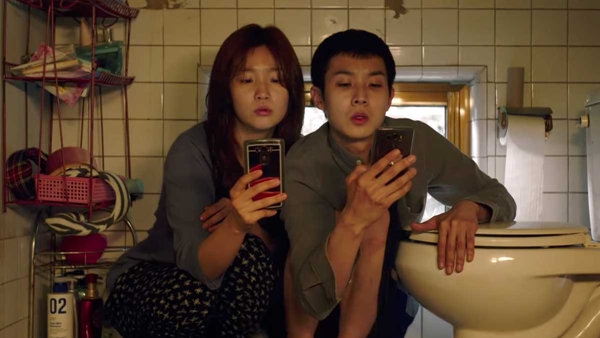
PARK SO-DAM AND CHOI WOO-SIK IN PARASITE
Last edited by Chris Knipp; 02-19-2020 at 12:49 AM.
-
MOTHERLESS BROOKLYN (Edward Norton 2019)
EDWARD NORTON: MOTHERLESS BROOKLYN (2019)
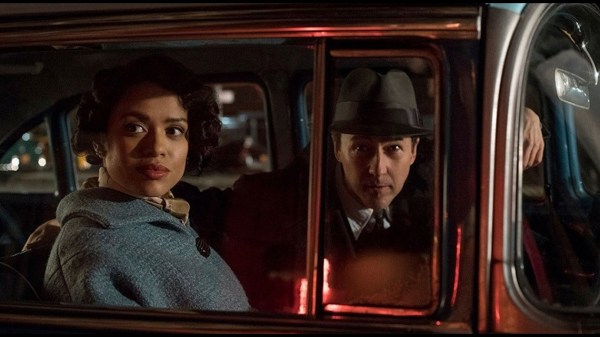
GUGU MBATHA-RAW AND EDWARD NORTON IN MOTHERLESS BROOKLYN
Edward Norton's passion project complicates the Jonathan Lethem novel
The NYFF Closing Night film is the premiere of Edwards Norton's adaptation, a triumph over many creative obstacles through a nine-year development time, of Jonathan Lethem's 1999 eponymous novel. It concerns Lionel Essrog (played by Norton), a man with Tourette's Syndrome who gets entangled in a police investigation using the obsessive and retentive mind that comes with his condition to solve the mystery. Much of the film, especially the first half, is dominated by Lionel's jerky motions and odd repetitive outbursts, for which he continually apologizes. Strange hero, but Lethem's creation. To go with the novel's evocation of Maltese Falcon style noir flavor, Norton has recast it from modern times to the Fifties.
Leading cast members, besides Norton himself, are Willem Dafoe, Bruce Willis, Alec Baldwin, Cherry Jones, Bobby Cannavale and Gugu Mbatha-Raw. In his recasting of the novel, as Peter Debruge explains in his Variety review, Norton makes as much use of Robert Caro's The Power Broker, about the manipulative city planner Robert Moses, a "visionary" insensitive to minorities and the poor, as of Lethem's book. Alec Baldwn's "Moses Randolph" role represents the film's Robert Moses character, who is added into the world of the original novel.
Some of the plot line may become obscure in the alternating sources of the film. But clearly Lionel Essrog, whose nervous sensibility hovers over things in Norton's voiceover, is a handicapped man with an extra ability who's one of four orphans from Saint Vincent's Orphanage in Brooklyn saved by Frank Minna (Bruce Willis), who runs a detective agency. When Minna is offed by the Mob in the opening minutes of the movie, Lionel goes chasing. Then he learns city bosses had a hand, and want to repress his efforts.
Gugu Mbatha-Raw's character, Laura Rose, who becomes a kind of love interest for Lionel Essrog, and likewise willem Dafoe's, Paul Randolph, Moses' brother and opponent, are additional key characters in the film not in the Johathan Lethem book. The cinematography is by the Mike Leigh regular (who produced the exquisite Turner), Dick Pope. He provides a lush, classic look.
Viewers will have to decide if this mixture of novel, non-fiction book and period recasting works for them or not. For many the problem is inherent in the Lethem novel, that it's a detective story where, as the original Times reviewer Albert Mobilio said, "solving the crime is beside the point." Certainly Norton has created a rich mixture, and this is a "labour of love," "as loving as it is laborious, maybe," is how the Guardian's Peter Bradshaw put it, writing (generally quite favorably) from Toronto. In her intro piece for the first part of the New York Film Festival for the Times Manohla Dargis linked it with the difficult Albert Serra'S Liberté with a one-word reaction: "oof," though she complemented these two as "choices rather than just opportunistically checked boxes." Motherless Brooklyn has many reasons for wanting to be in the New York Film Festival, and for the honor of Closing Night Film, notably the personal passion, but also the persistent rootedness in New York itself through these permutations.
Motherless Brooklyn, 144 mins., debuted at Telluride Aug. 30, 2019, showing at eight other festivals including Toronto, Vancouver, Mill Valley, and New York, where it was screened at the NYFF OCT. 11, 2019 as the Closing Night film. It opens theatrically in the US Nov. 1, 2019. Current Metascore 60%.
Last edited by Chris Knipp; 09-08-2021 at 01:08 PM.
-
THE IRISHMAN (Martin Scorsese 2019)
[Found also in Filmleaf's Festival Coverage section for the 2019 NYFF]
MARTIN SCORSESE: THE IRISHMAN (2019)
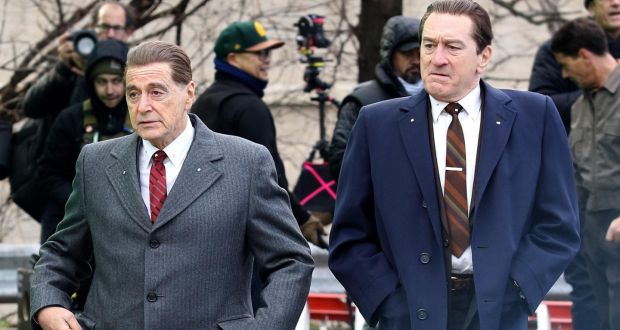
AL PACINO AND ROBERT DE NIRO IN THE IRISHMAN
Old song
From Martin Scorsese, who is in his late seventies, comes a major feature that is an old man's film. It's told by an old man, about old men, with old actors digitized (indifferently) to look like and play their younger selves as well. It's logical that The Irishman, about Teamsters loyalist and mob hit man Frank Sheeran (Robert De Niro), who became the bodyguard and then (as he tells it) the assassin of Union kingpin Jimmy Hoffa (Al Pacino) should have been chosen as Opening Night Film of the New York Film Festival. Scorsese is very New York, even if the film is set in Detroit. He is also a good friend of Film at Lincoln Center. And a great American director with an impressive body of work behind him.
To be honest, I am not a fan of Scorsese's feature films. I do not like them. They are unpleasant, humorless, laborious and cold. I admire his responsible passion for cinema and incestuous knowledge of it. I do like his documentaries. From Fran Lebowitz's talk about the one he made about her, I understand what a meticulous, obsessive craftsman he is in all his work. He also does have a sense of humor. See how he enjoys Fran's New York wit in Public Speaking. And there is much deadpan humor in The Irishman at the expense of the dimwitted, uncultured gangsters it depicts. Screenwriter Steven Zaillian's script based on Charles Brandt's book about Sheeran concocts numerous droll deadpan exchanges. It's a treat belatedly to see De Niro and Pacino acting together for the first time in extended scenes.
The Irishman is finely crafted and full of ideas and inspires many thoughts. But I found it monotonous and overlong - and frankly overrated. American film critics are loyal. Scorsese is an icon, and they feel obligated, I must assume, to worship it. He has made a big new film in his classic gangster vein, so it must be great. The Metascore, 94%, nonetheless is an astonishment. Review aggregating is not a science, but the makers of these scores seem to have tipped the scales. At least I hope more critics have found fault with The Irishman than that. They assign 80% ratings to some reviews that find serious fault, and supply only one negative one (Austin Chronicle, Richard Whittaker). Of course Armond White trashes the movie magnificently in National Review ("Déjà Vu Gangsterism"), but that's outside the mainstream mediocre media pale.
Other Scorsese stars join De Niro and Pacino, Joe Pesci, Harvey Keitel. This is a movie of old, ugly men. Even in meticulously staged crowd scenes, there is not one young or handsome face. Women are not a factor, not remotely featured as in Jonathan Demme's delightful Married to the Mob. There are two wives often seen, in the middle distance, made up and coiffed to the kitsch nines, in expensive pants suits, taking a cigarette break on car trips - it's a thing. But they don't come forward as characters. Note also that out of loyalty to his regulars, Scorsese uses an Italo-American actor to play an Irish-American. There's a far-fetched explanation of Frank's knowledge of Italian, but his Irishness doesn't emerge - just another indication of how monochromatic this movie is.
It's a movie though, ready to serve a loyal audience with ritual storytelling and violence, providing pleasures in its $140 million worth of production values in period feel, costumes, and snazzy old cars (though I still long for a period movie whose vehicles aren't all intact and shiny). This is not just a remake. Its very relentlessness in showing Frank's steady increments of slow progress up the second-tier Teamsters and mafia outsider functionary ladders is something new. But it reflects Scorsese's old worship of toughs and wise guys and seeming admiration for their violence.
I balk at Scorsese's representing union goons and gangsters as somehow heroic and tragic. Metacritic's only critic of the film, Richard Whittiker of the Austen Chronicle, seems alone in recognizing that this is not inevitable. He points out that while not "lionizing" mobsters, Scorsese still "romanticizes" them as "flawed yet still glamorous, undone by their own hubris." Whittiker - apparently alone in this - compares this indulgent touch with how the mafia is shown in "the Italian poliziotteschi," Italian Years of Lead gang films that showed them as "boors, bullies, and murderers, rather than genteel gentlemen who must occasionally get their hands dirty and do so oh-so-begrudgingly." Whittiker calls Scorsese's appeal to us to feel Sheeran's "angst" when he's being flown in to kill "his supposed friend" (Hoffa) "a demand too far."
All this reminded me of a richer 2019 New York Film Festival mafia experience, Marco Bellocchio's The Traitor/Il traditore, the epic, multi-continent story of Tommaso Buscetta, the first big Italian mafia figure who chose to turn state's witness. This is a gangster tale that has perspective, both morally and historically. And I was impressed that Pierfrancesco Favino, the star of the film, who gives a career-best performance as Buscetta, strongly urged us both before and after the NYFF public screening to bear in mind that these mafiosi are small, evil, stupid men. Coppola doesn't see that, but he made a glorious American gangster epic with range and perspective. In another format, so did David Chase om the 2000-2007 HBO epic, "The Sopranos." Scprsese has not done so. Monotonously, and at overblown length, he has once again depicted Italo-Americans as gangsters, and (this time) unions as gangs of thugs.
The Irishman, 209 mins,. debuted at New York as Opening Night Film; 15 other international festivals, US theatrical release Nov. 1, wide release in many countries online by Netflix Nov. 27. Metascore 94%.
Last edited by Chris Knipp; 11-23-2019 at 07:49 PM.
-
BACURAU (Kleber Mendonça Filho, Juliano Dornelles 2019)
KLEBER MENDOÇA FILHO, JULIANO DORNELLES: BACURAU (2019)
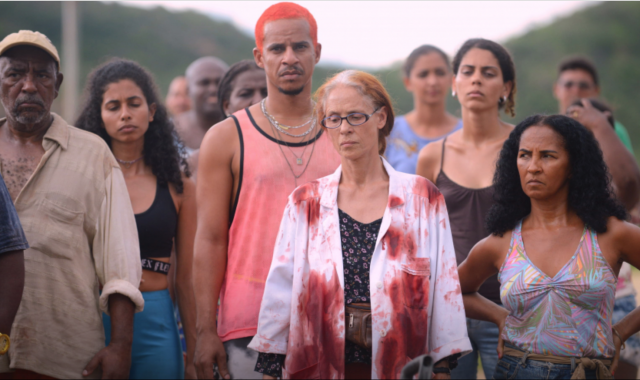
SONIA BRAGA (CENTER) IN BACURAU
Not just another Cannes mistake?
This is a bold film for an arthouse filmmaker to produce, and it has moments of rawness and unpredictability that are admirable. But it seems at first hand to be possibly a misstep both for the previously much subtler chronicler of social and political unease as seen in the 2011 Neighboring Sopunds and 2016 Aquarius, Kleber Mendonça Filho, and for Cannes, which may have awarded novelty rather than mastery in giving it half of the 2019 Jury Prize. It's a movie that excites and then delivers a series of scenes of growing disappointment and repugnance. But I'm not saying it won't surprise and awe you.
Let's begin with where we are, which is the Brazilian boonies. Bacurau was filmed in the village of Barra in the municipality of Parelhas and in the rural area of the municipality of Acari, at the Sertão do Seridó region, in Rio Grande do Norte. Mendonça Filho shares credit this time with his regular production designer Juliano Dornelles. (They both came originally from this general region, is one reason.) The Wikipedia article introduces it as a "Brazilian weird western film" and its rural shootout, its rush of horses, its showdowns, and its truckload of coffins may indeed befit that peculiar genre.
How are we to take the action? In his Hollywood Reporter review, Stephen Dalton surprises me by asserting that this third narrative feature "strikes a lighter tone" than the first two and combines "sunny small-town comedy with a fable-like plot" along with "a sprinkle of magic realism." This seems an absurdly watered down description, but the film is many things to many people because it embodies many things. In an interview with Emily Buder, Mendoça Filho himself describes it as a mix of "spaghetti Western, '70's sci-fi, social realist drama, and political satire."
The film feels real enough to be horrifying, but it enters risky sci-fi horror territory with its futuristic human hunting game topic, which has been mostly an area for schlock. (See a list of ten, with the 1932 Most Dangerous Game given as the trailblazer.) However, we have to acknowledge that Mendonca Filho is smart enough to know all this and may want to use the schlock format for his own sophisticated purpose. But despite Mike D'Angelo's conclusion on Letterboxd that the film may "require a second viewing following extensive reading" due to its rootedness in Brazilian politics, the focus on American imperialists and brutal outside exploiters from the extreme right isn't all that hard to grasp.
Bacurau starts off as if it means to be an entertainment, with conventional opening credits and a pleasant pop song celebrating Brazil, but that is surely ironic. A big water truck rides in rough, arriving with three bullet holes spewing agua that its driver hasn't noticed. (The road was bumpy.) There is a stupid, corrupt politician, mayor Tony Jr. (Thardelly Lima), who is complicit in robbing local areas of their water supply and who gets a final comeuppance. The focus is on Bacurau, a little semi-abandoned town in the north whose 94-year-old matriarch Carmelita dies and gets a funeral observation in which the whole town participates, though apart the ceremony's strange magic realist aspects Sonia Braga, as a local doctor called Domingas, stages a loud scene because she insists that the deceased woman was evil. Then, with some, including Carmelita's granddaughter Teresa (Barbara Colen), returned to town from elsewhere, along with the handsome Pacote (Tomaso Aquinas) and a useful psychotic local killer and protector of water rights called Lunga (Silvero Pereira), hostile outsiders arrive, though as yet unseen. Their forerunners are a colorfully costumed Brazilian couple in clownish spandex suits on dustrider motorcycles who come through the town. When they're gone, it's discovered seven people have been shot.
They were an advance crew for a gang of mostly American white people headed by Michael (Udo Kier), whose awkward, combative, and finally murderous conference we visit. This is a bad scene in more ways than one: it's not only sinister and racist, but clumsy, destroying the air of menace and unpredictability maintained in the depiction of Bacurau scenes. But we learn the cell phone coverage of the town has been blocked, it is somehow not included on maps, and communications between northern and southern Brazil are temporarily suspended, so the setting is perfect for this ugly group to do what they've come for, kill locals for sport using collectible automatic weapons. Overhead there is a flying-saucer-shaped drone rumbling in English. How it functions isn't quite clear, but symbolically it refers to American manipulation from higher up. The way the rural area is being choked off requires no mention of Brazil's new right wing strong man Jair Bolsonaro and the Amazonian rain forest.
"They're not going to kill a kid," I said as a group of local children gather, the most normal, best dressed Bacurauans on screen so far, and play a game of dare as night falls to tease us, one by one creeping as far as they can into the dark. But sure enough, a kid gets shot. At least even the bad guys agree this was foul play. And the bad guys get theirs, just as in a good Western. But after a while, the action seems almost too symbolically satisfying - though this is achieved with good staging and classic visual flair through zooms, split diopter effects, Cinemascope, and other old fashioned techniques.
I'm not the only one finding Bacurau intriguing yet fearing that it winds up being confused and all over the place. It would work much better if it were dramatically tighter. Peter DeBruge in Variety notes that the filmakers "haven’t figured out how to create that hair-bristling anticipation of imminent violence that comes so naturally to someone like Quentin Tarantino." Mere vague unexpectedness isn't scary, and all the danger and killing aren't wielded as effectively as they should be to hold our attention and manipulate our emotions.
Bacurau, 131 mins., debuted in Competition at Cannes, where it tied for the Jury Prize with the French film, Ladj Ly's Les misérables. Many other awards and at least 31 other festivals including the NYFF. Metascore 74%. AlloCiné press rating 3.8, with a rare rave from Cahiers du Cinéma. US theatrical distribution by Kino Lorber began Mar. 13, 2020, but due to general theater closings caused by the coronavirus pandemic the company launched a "virtual theatrical exhibition initiative," Kino Marquee, with this film from Mar. 19.
Last edited by Chris Knipp; 04-05-2020 at 12:24 PM.
-
ZOMBI CHILD (Bertrand Bonello 2019)
BERTRAND BONELLO: ZOMBI CHILD (2019)
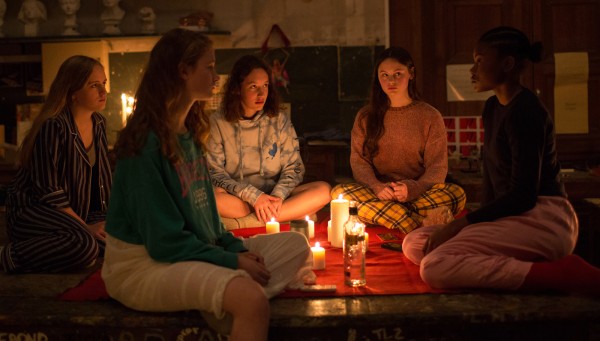
LOUISE LABEQUE AND WISLANDA LOUIMAT (FAR RIGHT) IN ZOMBI CHILD
Voodoo comes to Paris
If you said Betrand Bonello's films are beautiful, sexy, and provocative you would not be wrong. This new, officially fifth feature (I've still not seen his first one, the 2008 On War), has those elements. Its imagery, full of deep contrasts, can only be described as lush. Its intertwined narrative is puzzling as well.
We're taken right away to Haiti and plunged into the world of voodoo and zombies. Ground powder from the cut-up body of a blowfish is dropped, unbeknownst to him, into a man's shoes. Walking in them, he soon falters and falls. Later, he's aroused from death to the half-alive state of a zombie - and pushed into a numb, helpless labor in the hell of a a sugar cane field with other victims of the same cruel enchantment. In time however something arouses him to enough life to escape.
Some of the Haitian sequences center around a moonlit cemetery whose large tombs seem airy and haunted and astonishingly grand for what we know as the poorest country in the hemisphere.
From the thumping, vibrant ceremonies of Haitian voodoo (Bonello's command of music is always fresh and astonishing as his images are lush and beautiful) we're rushed to the grandest private boarding school you've ever seen, housed in vast stone government buildings. This noble domaine was established by Napoleon Bonaparte on the edge of Paris, in Saint Denis, for the education of children of recipients of the Legion of Honor. It really exists, and attendance there is still on an honorary basis.
Zombi Child oscillates between girls in this very posh Parisian school and people in Haiti. But these are not wholly separate places. A story about a Haitian grandfather (the zombie victim, granted a second life) and his descendants links the two strains. It turns out one of those descendants, Mélissa (Wislanda Louimat), is a new student at the school. A white schoolgirl, Fanny (the dreamy Louise Labeque), who's Mélissa's friend and sponsors her for membership in a sorority, while increasingly possessed by a perhaps imaginary love, also bridges the gap. For the sorority admission Mélissa confesses the family secret of a zombi and voodoo knowledge in her background.
Thierry Méranger of Cahiers du Cinéma calls this screenplay "eminently Bonellian in its double orientation," its "interplay of echoes" between "radically different" worlds designed to "stimulate the spectator's reflection." Justin Chang of the Los Angeles Times bluntly declares that it's meant to "interrogate the bitter legacy of French colonialism."
But how so? And if so, this could be a tricky proposition. On NPR Andrew Lapin was partly admiring of how "cerebral and slippery" the film is, but suggests that since voodoo and zombies are all most white people "already know" about Haitian culture, a director coming from Haiti's former colonizing nation (France) must do "a lot of legwork to use these elements successfully in a "fable" where "the real horror is colonialism." The posh school comes from Napoleon, who coopted the French revolution, and class scenes include a history professor lecturing on this and how "liberalism obscures liberty."
I'm more inclined to agree with Glenn Kenny's more delicately worded praise in his short New York Times review of the film where he asserts that the movie’s inconclusiveness is the source of its appeal. Zombi Child, he says, is fueled by insinuation and fascination. The fascination, the potent power, of the occult, that's what Haiti has that the first wold lacks.
One moment made me authentically jump, but Bonello isn't offering a conventional horror movie. He's more interested in making his hints of voodoo's power and attraction, even for the white lovelorn schoolgirl, seem as convincing as his voodoo ceremonies, both abroad and back in Haiti, feel thoroughly attractive, or scary, and real. These are some of the best voodoo scenes in a movie. This still may seem like a concoction to you. Its enchantments were more those of the luxuriant imagery, the flowing camerawork, the delicious use of moon- and candle-light, the beautiful people, of whatever color. This is world-class filmmaking even if it's not Bonello's best work.
Bonello stages things, gets his actors to live them completely, then steps back and lets it happen. Glenn Kenny says his "hallmark" is his "dreamy detachment." My first look at that was the 2011 House of Tolerence (L'Apollonide - mémoires de la maison close), which I saw in Paris, a languorous immersion in a turn-of-the-century Parisian brothel, intoxicating, sexy, slightly repugnant. Next came his most ambitious project, Saint Laurent(2014), focused on a very druggy period in the designer's career and a final moment of decline. He has said this became a kind of matching panel for Apollonide. (You'll find that in an excellent long Q&A after the NYFF screening.) Saint Laurent's "forbidden" (unsanctioned) picture of the fashion house is as intoxicating, vibrant, and cloying as the maison close, with its opium, champagne, disfigurement and syphilis. No one can say Gaspard Ulliel wasn't totally immersed in his performance. Nocturama (2016) takes a group of wild young people who stage a terrorist act in Paris, who seem to run aground in a posh department store at the end, Bonello again getting intense action going and then seeming to leave it to its own devices, foundering. Those who saw the result as "shallow cynicism" (like A.O. Scott) missed how exciting and powerful it was. (Mike D'Angelo didn't.)
Zombi Child is exciting at times too. But despite its gorgeous imagery and sound, its back and forth dialectic seems more artificial and calculating than Bonello's previous films.
Zombi Child, mins., debuted at Cannes Directors Fortnight May 2019, included in 13 other international festivals, including Toronto and New York. It released theatrically in France Jun. 12, 2020 (AlloCiné press rating 3.7m 75%) and in the US Jan. 24, 2020 (Metascore 75%). Now available in "virtual theater" through Film Movement (Mar. 23-May 1, 2020), which benefits the theater of your choice. https://www.filmmovement.com/zombi-child
Last edited by Chris Knipp; 04-07-2020 at 07:36 PM.
 Posting Permissions
Posting Permissions
- You may not post new threads
- You may not post replies
- You may not post attachments
- You may not edit your posts
-
Forum Rules





 Reply With Quote
Reply With Quote







Bookmarks